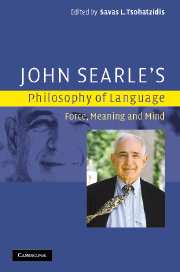Book contents
- Frontmatter
- Contents
- List of contributors
- Acknowledgments
- Introduction
- 1 What is language: some preliminary remarks
- PART I FROM MIND TO MEANING
- PART II FROM MEANING TO FORCE
- 8 How to say things with words
- 9 Semantics without the distinction between sense and force
- 10 Dynamic discourse semantics for embedded speech acts
- 11 Yes–no questions and the myth of content invariance
- 12 How do speech acts express psychological states?
- References
- Index
8 - How to say things with words
Published online by Cambridge University Press: 08 January 2010
- Frontmatter
- Contents
- List of contributors
- Acknowledgments
- Introduction
- 1 What is language: some preliminary remarks
- PART I FROM MIND TO MEANING
- PART II FROM MEANING TO FORCE
- 8 How to say things with words
- 9 Semantics without the distinction between sense and force
- 10 Dynamic discourse semantics for embedded speech acts
- 11 Yes–no questions and the myth of content invariance
- 12 How do speech acts express psychological states?
- References
- Index
Summary
INTRODUCTION
You really do not need us to tell you how to say things with words, any more than you (or your ancestors) needed J. L. Austin or his student John Searle to tell you how to do things with words. Austin's How to Do Things with Words (1961) and Searle's Speech Acts (1969) offered a theory to explain how we do things that go beyond saying: that is, how we perform illocutionary and perlocutionary acts in and by saying things.
In this chapter, we develop Austin's concept of a locutionary act, using the “reflexive-referential theory” of meaning and cognitive significance as developed in Perry's Reference and Reflexivity (2001). We distinguish the locutionary content of an act both from what a speaker says and what a speaker intends to say. These three concepts often coincide, but keeping them separate is important in reconstructing the plans of speakers and the inferences of hearers, for those cases in which the concepts diverge are often of great theoretical interest.
Our plan is as follows. In section 2 we give an overview of our reasons for distinguishing locutionary content from what is said. In section 3 we explain locutionary content in the context of speakers' plans. In section 4 we look at a number of examples to show how locutionary content can diverge from what is said. In section 5 we compare our concepts to Austin's, and consider Searle's misgivings about locutionary acts.
- Type
- Chapter
- Information
- John Searle's Philosophy of LanguageForce, Meaning and Mind, pp. 169 - 189Publisher: Cambridge University PressPrint publication year: 2007
- 2
- Cited by



